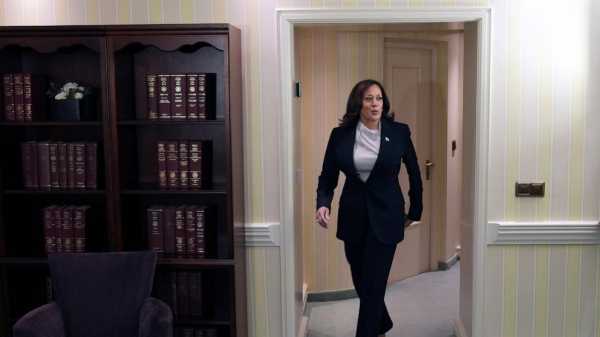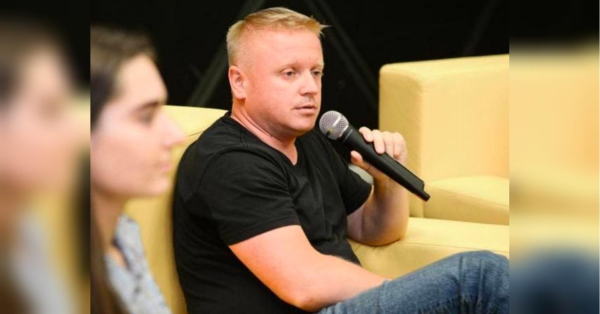
MUNICH — The United States has determined that Russia has committed crimes against humanity in Ukraine, Vice President Kamala Harris said Saturday, insisting that “justice must be served” to the perpetrators.
Speaking at the Munich Security Conference, Harris said the international community has both a moral and a strategic interest in pursuing those crimes, pointing to a danger of other authoritarian governments taking advantage if international rules are undermined.
“Russian forces have pursued a widespread and systemic attack against a civilian population — gruesome acts of murder, torture, rape, and deportation,” Harris said. She also cited “execution-style killings, beatings, and electrocution.”
The Biden administration formally determined last March that Russian troops had committed war crimes in Ukraine and said it would work with others to prosecute offenders. A determination of crimes against humanity goes a step further, indicating that attacks against civilians are being carried out in a widespread and systematic manner.
“Russian authorities have forcibly deported hundreds of thousands of people, from Ukraine to Russia, including children,” Harris said. “They have cruelly separated children from their families."
She also pointed to the attack in mid-March on a theater in the strategic port city of Mariupol where civilians had been sheltering, which killed hundreds, and to the images of civilians' bodies left on the streets of Bucha after the Russian pullback from the Kyiv area last spring.
Harris said that as a former prosecutor and former head of California's Department of Justice, she knows “the importance of gathering facts and holding them up against the law.”
“In the case of Russia’s actions in Ukraine, we have examined the evidence, we know the legal standards, and there is no doubt,” she said. “These are crimes against humanity.”
U.S. Secretary of State Antony Blinken, who also was attending the Munich conference, said in a statement issued as Harris spoke that “we reserve crimes against humanity determinations for the most egregious crimes.”
The new determination underlines the “staggering extent” of suffering inflicted on Ukrainian civilians and “also reflects the deep commitment of the United States to holding members of Russia’s forces and other Russian officials accountable for their atrocities,” he said.
In an address to his country on Saturday, Ukrainian President Volodymyr Zelenskyy said Kyiv this week had gotten “strong signals from our partners, specific agreements on the inevitability of holding Russia accountable for aggression, for terror against Ukraine and its people.”
“Every Russian attack … on every corner of our state will have concrete legal consequences for the terrorist state,” Zelenskyy said, citing attacks not just in the past year of war but dating back to 2014, when fighting with Russia-backed separatists in eastern Ukraine first broke out.
The president did not refer specifically to Harris’ remarks or name any countries that had provided agreements on Russian accountability.
Russia's nearly yearlong invasion of Ukraine, has dominated discussions at the Munich conference, an annual gathering of security and defense officials from around the world. Harris told the assembled participants: "Let us all agree — on behalf of all the victims, both known and unknown, justice must be served.”
“Such is our moral interest,” she said. “We also have a significant strategic interest.”
If Russian President Vladimir Putin succeeds in attacking international rules and norms, she said, “other authoritarian powers could seek to bend the world to their will, through coercion, disinformation and even brute force.”
Harris' audience Saturday didn't include any Russian officials. Conference organizers decided not to invite them this year.
While Western officials defended arms supplies to Ukraine, China's top diplomat, Wang Yi, called for an end to the war through peace talks, saying Beijing was “deeply worried about the expansion and long-term effect of this war."
China has refused to condemn Russia's invasion of Ukraine or to impose sanctions on Moscow like Western nations have done. Without naming any countries, Wang said “there may be forces” that don't want the war to stop anytime soon.
“What they care about is not the life and death of the Ukrainian people, nor the increasing damage to Europe. They probably have bigger strategic goals than Ukraine,” he said.
Asked on the sidelines of the event about the U.S. determination of crimes against humanity, Ukrainian Foreign Minister Dmytro Kuleba replied that “Russia waged a genocidal war against Ukrainians because they do not recognize our identity and they do not think we deserve to exist as a sovereign nation."
“Everything that stems from that is crimes against humanity, war crimes and various other atrocities committed by the Russian army in the territory of Ukraine,” he said. "Let lawyers sort out specifically which act belongs where in terms of legal qualification.”
Zelenskyy had urged Western allies in a video address to the conference on Friday to quicken their military support for Ukraine.
Kuleba voiced confidence that Ukraine would eventually receive fighter jets from its partners, despite their current reluctance. He noted that they initially pushed back on providing other heavy weapons that were later delivered or promised.
In Munich on Friday, a Ukrainian deputy prime minister, Oleksandr Kubrakov, called for cluster munitions and phosphorous bombs, German media reported. Cluster munitions are banned by an international treaty.
Asked whether he supported calling for such weapons, Kuleba said Ukraine has evidence that Russia uses them.
“We are not party to the convention on the prohibition of cluster ammunition, so legally there are no obstacles for that,” he said. “And if we receive one, we will be using it exclusively against military forces of the Russian Federation.”
___
Geir Moulson contributed to this report from Berlin.
___
Follow AP’s coverage of the war in Ukraine: https://apnews.com/hub/russia-ukraine
Sourse: abcnews.go.com






